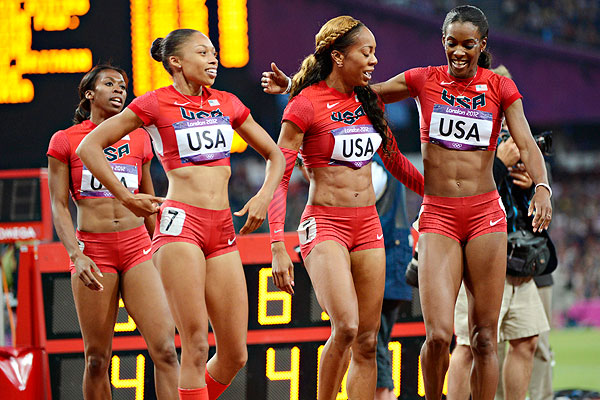From the San Fransisco Gate, "Strong is pretty, and Olympics are proof," by Laila A. Ali and Kathryn E. Olson, on 16 August 2012 -- Fully 40 years after the passage of Title IX of our nation's Civil Rights Act, female athletes have come into their own. The chalk dust is still settling from this year's Olympic Games, and the ink is still drying on astounding new Olympic and world records. But before the Games fade into history, let the record show that among world-class athletes, this was the Year of the Woman.
Although much remains to be done to advance women in Olympic competition, the International Olympic Committee showed what could happen if change becomes not an evolutionary but an intentional part of the larger work of advancing excellence in sports. For the first time, every nation participating in the Games had a woman on its team, even the previously unthinkable: a woman in the judo competition representing Saudi Arabia.
U.S. commentators observed that, had they been counted as a separate country, the American women who won medals would have ranked third in total medal count among nations. Women represented the majority on Team USA for the first time. Of our nation's 46 gold medals, 63 percent were won by women - another first. Their performances captivated Americans and captured the hearts of millions of teen girls; viewership of the Olympics by teenage American girls was up a whopping 54 percent. It is no wonder, given the performances by the likes of Claressa Shields, Gabby Douglas, Aly Raisman, Missy Franklin, Carmelita Jeter and three-time gold medalists Misty May-Treanor and Kerri Walsh.

Word spread during the Olympics that "strong is the new pretty." We can only hope this new adage will stick - and become at least a partial antidote to the manufactured images of women and girls served up by the popular media as the feminine ideal.

But we can't rest here. Women were still objectified during this year's games. After a year of strong performances culminated in a fourth-place finish in London, Lolo Jones grieved over being verbally shredded about her appearance. And for Douglas, the strong young gymnast whose skills matched her shining smile, her history-making gold medal performances shared headlines with unnecessary judgments about her hair.
\
Instead of irrelevant criticism, let's focus on performance.
Let's also focus on encouraging and enabling all women and girls to participate in sports; there is still much work to be done. Women and girls still face major barriers to access, including lack of opportunities and conflicting messages in society about whether they should participate, what they should look like, who they should "be."

By age 14, girls drop out of sports at twice the rate of boys. Lack of access to sport is a drop-out driver because, in spite of Title IX, which bans sex discrimination in academics and sports, there are still 1.3 million fewer opportunities for girls to participate in high school sports (60,000 fewer in college). Girls often struggle to find a spot on a team, especially in underserved communities where cultural and economic barriers make female participation in sports even more challenging.

Complicating all this are the persistent messages girls receive on the importance of being "Hollywood thin" rather than emulating strong, athletic role models like the ones who medaled in London - or like Geena Davis, the Hollywood star who was an Olympic archery candidate.
Why does it matter? Why do female athletes excelling in Olympic competition make a difference for young women and girls? In the United States it is estimated that 80 percent of our female executives participated actively in sports earlier in their lives. Sports, at its best, is a metaphor for life and a teaching ground for teamwork, leadership, coping with winning and losing, and pursuing one's personal best.
For women, it is about this and more: a way for women to develop their strength and their power, both literally and figuratively. In this 40th anniversary year of Title IX, let us remember those leaders who fought to pass that legislation, let institutions take seriously the letter of the law, and let us translate its values into women's sports as an example to the world.
World champion boxer Laila A. Ali is president and Kathryn E. Olson is CEO of the Women's Sports Foundation. (source: San Fransisco Gate )






No comments:
Post a Comment